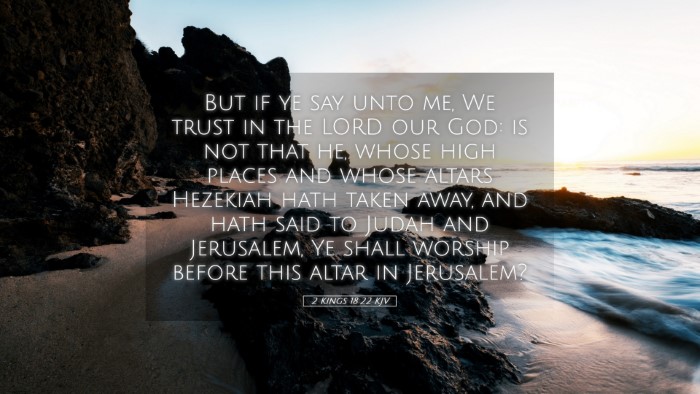Commentary on 2 Kings 18:22
Verse: "But if you say to me, ‘We trust in the Lord our God,’ is it not he whose high places and altars Hezekiah has removed, saying to Judah and to Jerusalem, ‘You shall worship before this altar in Jerusalem’?"
Introduction
This verse part of a critical dialogue during the Assyrian siege of Jerusalem, showcases a moment of psychological warfare where the Assyrian representatives seek to undermine Hezekiah's reforms and the people's faith in God. It reflects not only the political climate of the time but also significant theological implications centered around worship and divine favor.
The Context of Hezekiah’s Reforms
- Hezekiah's Religious Reforms: Hezekiah, king of Judah, implemented significant religious reforms, centralizing worship in Jerusalem and destroying high places and altars dedicated to false gods (2 Kings 18:4). This highlights his commitment to true worship and obedience to Yahweh.
- Historical Context: The Assyrian Empire posed a grave threat during this period, as they sought to conquer Judah. Hezekiah's reforms were not only spiritual but a strategic move to unify the kingdom under a single worship location.
Matthew Henry notes that Hezekiah’s actions were part of a larger prophetic tradition, where the Lord commanded exclusive worship at the temple in Jerusalem.
Assyria’s Challenge and Propaganda
In the verse under consideration, the Assyrians—led by the Rabshakeh—attempt to dissuade the people of Judah from trusting in their God. This was a common tactic used by conquering powers to instill doubt and create divisions among those they sought to conquer.
- Psychological Warfare: The Rabshakeh's challenge questions the legitimacy of Hezekiah’s reforms, implying that the removal of high places has angered Yahweh, suggesting that faith in God has become futile.
- Misrepresentation of Worship: By questioning the centralization of worship, he attempts to portray it as a handicap rather than a divine directive, manipulating the theology of the people against their king.
Albert Barnes comments on how the Assyrians misunderstood or misrepresented the worship of Yahweh, thereby attempting to sway the allegiance of the people through subtle insinuation against their leader.
Theological Implications
- Centralization of Worship: Hezekiah’s reforms highlight a critical theological stance—true worship must be directed toward the Lord in the prescribed manner. This reinforces the unique relationship between God and His people, which the Assyrians sought to undermine.
- Faith and Trust: The challenge posed by the Rabshakeh forces the people of Judah into a position where they must reaffirm their faith amid trials. It echoes the challenges believers face when worldly powers seek to sow doubt about God's faithfulness.
Adam Clarke elucidates that the importance of worship in the right place cannot be overstated, as it symbolizes one’s need for an authentic encounter with God.
Practical Applications
- Importance of Leadership: Pastors and spiritual leaders must be aware of the spiritual warfare they engage in. Like Hezekiah, they are called to guide their congregations towards faithfulness against external and internal doubts.
- Resilience in Faith: Believers today draw encouragement from Hezekiah's stand against external pressures. The challenge is to hold firm to one’s faith and to find strength in communal worship, even in the face of adversity.
- Faith in Action: Trusting God amidst challenges requires tangible actions—like Hezekiah’s proactive reforms. This can inspire congregations to actively engage in their faith lives, taking steps to worship authentically.
In the face of modern-day challenges, this scripture invites reflection on where our trust lies and how we respond to the pressures that seek to compromise our faith.
Conclusion
2 Kings 18:22 serves as a powerful reminder of the challenges faced by the faithful amidst external pressures. The exchange reveals the tension between human leadership and divine guidance, encouraging deeper exploration of commitment to God. As pastors, students, theologians, and Bible scholars reflect upon this verse, they are called to reinforce true worship in their communities, embracing the resilience that faith offers in the face of adversity. Through this scripture, we are reminded that God’s covenant remains steadfast, even when the world around us seeks to dissuade and intimidate.


